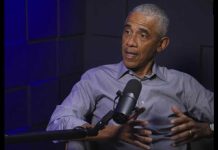
Minnesota’s largest-ever manhunt ended with the capture of Vance Boelter, the security company CEO accused of impersonating a police officer to assassinate state lawmakers in what authorities are calling a politically motivated attack.
Key Takeaways
- Vance Boelter, 57, was arrested after a two-day manhunt in Minnesota following the assassination of state House DFL Leader Melissa Hortman and shooting of state Sen. John Hoffman and their spouses.
- Boelter, CEO of Red Lion Group in the Democratic Republic of Congo and Praetorian Guard Security Services, has extensive international security experience in Eastern Europe, Africa, and the Middle East.
- Authorities found firearms and a list of approximately 70 public officials’ names and addresses in Boelter’s vehicle, suggesting the potential for additional targeted attacks.
- Despite being described as a Trump supporter, Boelter had previously been appointed to Minnesota government positions by Democratic governors in 2016 and 2019.
- The suspect had reportedly texted roommates about financial hardships and that he might “be dead shortly” before the attacks occurred.
Massive Manhunt Concludes with Suspect’s Arrest
Vance Luther Boelter, the 57-year-old security company CEO accused of assassinating a Minnesota lawmaker, was apprehended after what officials described as “the largest manhunt in the state’s history,” involving drones, SWAT teams, and multiple law enforcement agencies. The two-day search ended in rural Sibley County, where authorities found the suspect who had allegedly posed as a police officer to gain access to his victims. Boelter now faces two counts of second-degree murder and two counts of second-degree attempted murder after the shooting that left State House DFL Leader Melissa Hortman dead and seriously injured State Senator John Hoffman and the spouses of both lawmakers.
The arrest was announced by Minnesota Governor Tim Walz, who condemned the attacks as a “politically motivated assassination.” Law enforcement officials revealed that surveillance footage showed Boelter dressed as a police officer during the attacks, a calculated disguise that allowed him access to his targets. The suspect’s wife was initially detained for questioning but was later released as authorities worked to understand the full scope and motivation behind the attacks. President Donald Trump addressed the nation following the arrest, stating that such violence would not be tolerated in the United States.
International Security Connections Raise Concerns
Investigations into Boelter’s background revealed a complex network of international security operations and business ventures. As CEO of the Red Lion Group based in the Democratic Republic of Congo and co-founder of Praetorian Guard Security Services in Minnesota with his wife Jenny, Boelter had established himself as a security professional with global connections. His involvement extended to various business sectors in the DRC, including agriculture, fishing, media, security operations, and even a proposed “women-led motorcycle-taxi business,” according to his own public statements.
“This all started back in 2019, when my partner, McNay Nkashama, brought in the ambassador from the DRC to Minnesota, and we had meetings, the bulk of them in Minneapolis but the bulk of them that I was at was in Worthington, Minnesota where we made those connections,” Boetler said.
His academic credentials include degrees in international relations, management, and leadership from St. Cloud State University and Cardinal Stritch University. Before his international security career, Boelter worked in food service management at companies including 7-Eleven, Del Monte, Johnsonville Sausage, and Greencore. Despite being characterized as a Trump supporter, Boelter had been appointed to Minnesota government positions by Democratic governors in both 2016 and 2019, suggesting complex political affiliations that investigators are now scrutinizing for potential motives.
Alarming Evidence Suggests Broader Targets
What particularly alarmed authorities was the discovery of a list containing the names and addresses of approximately 70 public officials found in Boelter’s vehicle, along with multiple firearms. This evidence suggests the possibility that the shootings may have been just the beginning of a larger planned series of attacks. The list reportedly targeted primarily Democratic and pro-choice politicians, though investigators have not confirmed the discovery of a formal manifesto outlining the suspect’s ideology or specific grievances against his targets.
“One man’s unthinkable actions have altered the State of Minnesota,” said Gov. Tim Walz following the arrest, reflecting the shock and grief that has overtaken the state in the wake of what U.S. Senator Amy Klobuchar described the actions of a murderous man.
In the hours before the attack, Boelter had reportedly informed his roommates via text message that he might “be dead shortly” and mentioned financial hardships, suggesting a potential suicide-by-cop scenario that thankfully did not materialize during his arrest. The attack occurred amid heightened political tensions nationwide, coinciding with a military parade in Washington, D.C., and “No Kings” protests, though investigators have not yet established any direct connection between these events and Boelter’s actions.
State Mourns as Investigation Continues
The politically motivated assassination has left Minnesota in a state of profound shock and mourning. Memorial services and fundraisers for the victims have begun across the state as communities grapple with this unprecedented act of political violence. Brooklyn Park Police Chief Mark Bruley, who helped coordinate the massive search effort, acknowledged the historical significance of the operation, calling it “the largest manhunt in the state’s history,” reflecting both the severity of the crime and the determination of law enforcement to bring the suspect to justice.
As the investigation continues, authorities are examining Boelter’s financial troubles, his international connections, and his political beliefs for potential motives. The incident serves as a stark reminder of the dangers of political extremism and the devastating consequences when rhetoric transforms into violence. The case has prompted renewed calls for civility in political discourse and heightened security measures for elected officials who increasingly face threats in the current polarized climate.













